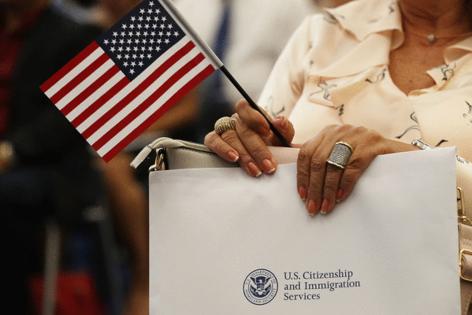Editorial: The immigration welcome mat for Cubans, which helped build Miami, is over
Published in Op Eds
In a major legal blow to the Trump administration’s mass deportation efforts, a federal judge this week blocked a plan to strip protections from more than half a million immigrants from Cuba, Haiti, Nicaragua and Venezuela — many of whom now live in South Florida under what’s known as the CHNV program.
The court order landed just in time to stop, at least for now, what would’ve been the most dramatic shift in U.S. immigration policy toward Cubans since the early Castro years. Along with the end of “wet-foot, dry-foot” in 2017, it’s the latest nail in the coffin of a long-standing assumption: that Cubans who reach U.S. soil are treated differently.
That era is over.
For decades, Cubans fleeing Fidel Castro’s rule found refuge in Miami with relatively few immigration hurdles. The 1966 Cuban Adjustment Act gave them a unique fast track to legal residency — a privilege no other migrant group enjoyed. Had the federal judge not stepped in, roughly 110,000 Cubans would have lost their status overnight, turning them into undocumented immigrants eligible for deportation.
Regardless of what happens next, this moment marks new territory for South Florida, where generations of Cuban families — many of them loyal Trump voters — have found a second home. Now, recent arrivals face detention, removal or the uncertainty of life in immigration limbo.
This is the new reality for Cuban immigrants in America.
When the Trump administration moved to end the CHNV program — a legal pathway created by the Biden administration that allowed 532,000 migrants from four countries to enter the U.S. with work permits and two-year protection from deportation — quiet panic spread fast. Suddenly, thousands were undocumented.
Thankfully, a federal judge in Massachusetts ruled Monday that the government can’t strip legal protections from these migrants without reviewing their individual cases. Her ruling halted deportation orders set to begin April 24 and paused “self-deportation” notices. The Trump administration will likely appeal.
The swift decision to allow these deportations met little resistance from the Miami-Dade congressional delegation, which angered Miami healthcare executive Mike Fernandez. In a searing open letter to them, the deep-pocketed political donor, wrote: “Your silence is neither neutral nor ignorance; it is complicity and cowardice.” No doubt he is speaking for those among South Florida’s immigrant communities who now watch with alarm as the same protections that once helped their families build lives are being stripped from a new generation.
At the same time, the Trump administration has been tightening economic screws on Cuba: cutting off remittances, halting flights and shutting down online grocery services that had become lifelines for families on the island. The goal? Collapse the regime. Republican Rep. Carlos Gimenez urged the Treasury Department to “cut off the oxygen” to the Cuban government. But these moves may well worsen a humanitarian crisis. And history tells us what usually comes next.
U.S.-Cuba policy has followed a predictable rhythm: apply pressure, watch things deteriorate in Havana and prepare for the next wave of Cubans heading to Florida. This time, though, the doors will be closed.
For Cubans and others, the CHNV program was meant to provide a legal alternative for those trying to cross illegally. Applicants made reservations online, secured a sponsor and passed background checks. For Cubans, it offered a back door to the Cuban Adjustment Act. But when Trump returned to office, his administration canceled the program for all who received it during the Biden administration. Cruel.
By March, Homeland Security gave CHNV participants 30 days to leave or face arrest. The underlying implication: Even if you followed the rules, you were no longer protected or considered to be legally in the country.
The favorable federal ruling has bought CHNV migrants time. But the broader message is clear: For the first time in over 60 years, Cubans are being treated like any other immigrant group. Their controversial special status, born from American guilt over Castro’s rise and the Bay of Pigs fiasco, is ending.
But if Washington wants to tighten the screws on the regime, it must find a way to do so without abandoning those trying to flee.
___
©2025 Miami Herald. Visit at miamiherald.com. Distributed by Tribune Content Agency, LLC.




























































Comments